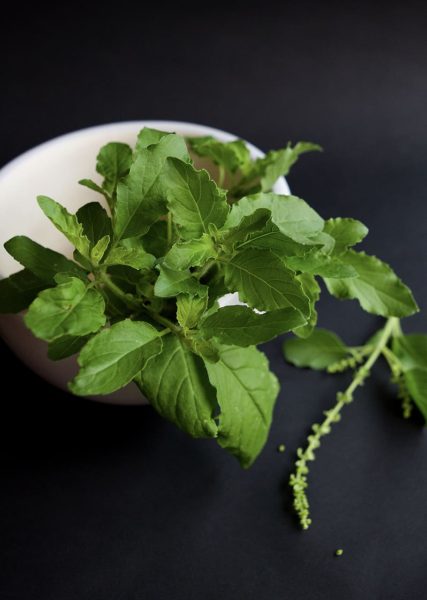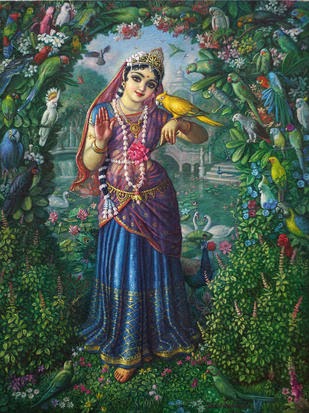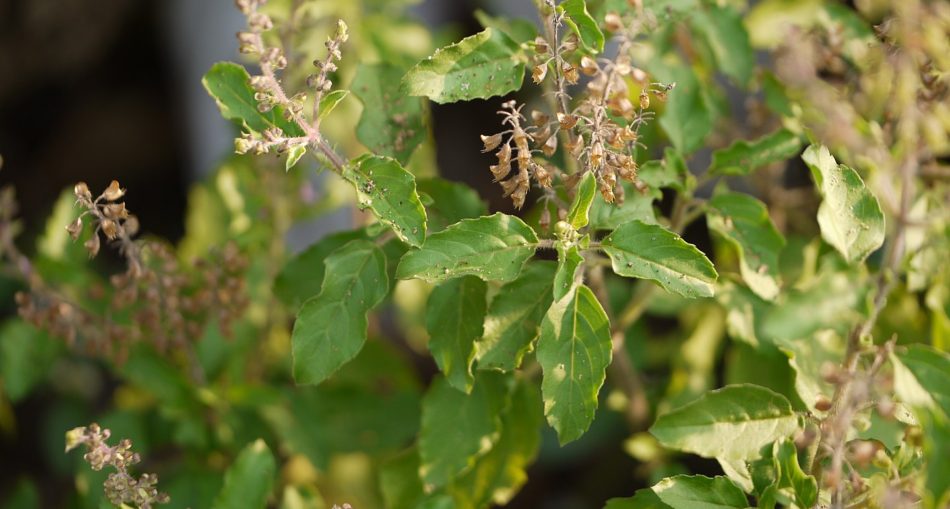If you were to visit any Hindu relatives in Guyana, you would see at least one tulsi plant in their yards. Some of you may know this plant by the name of basil, holy basil or tulasi.

A typical Tulsi plant – Image Source: https://www.pxfuel.com/en/free-photo-icstj
This aromatic herb is sacred and has an integral part in Hindu religious practices and for this reason, you will find these plants in various mandirs or temples and homes across Guyana. During prayers, pujas, and havans among other Hindu ceremonies, you will see the tulsi being used. Potted tulsi plants are also used as decoration in the yards of Hindus across Guyana. Like the many parts of Hinduism, the tulsi plant has a great significance in the religion.
The Tulsi Plant
The scientific name of the tulsi plant is ocimum tenuiflorum and it belongs to the family of Lamiaceae. It is a perennial plant, which means it lives for more than two years. It is a shrub with hairy stems and purple blooms of flowers. The tulsi plant gives off a clove-like smell. It is native to India but grows in the tropical areas of the world. Some countries where you can find the tulsi or holy basil plant are Bangladesh, Thailand, Kenya, Trinidad and Tobago, Nepal, Guyana, and Suriname.
Types of Tulsi
- Rama Tulsi or the Green Leaf Tulsi – has light purple flowers and an aromatic, clove-like scent
- Krishna Tulsi – this plant is purple and smells like a clove with a hint of pepper. It is known as the Shyama Tulsi or Purple Leaf Tulsi
- Vana Tulsi – Another name for this is Wild Leaf Tulsi. It is a bright, pale green plant with a lemony smell and flavour
Uses of the Tulsi
Religious Practices
This is a sacred plant in Hinduism and is used in many rituals and ceremonies. In India, a tulsi plant is usually found in the middle of courtyards. Womenfolk are given the responsibility of taking care of the plant. The tulsi is offered to Lord Vishnu or Shri Krishna during prayers. The tulsi plant itself is also worshipped because believers think it’s the one that pleases Lord Vishnu the most. Tulsi leaves are even added to ‘parsad’-the holy offerings at pujas and temples.
Traditional Medicine
Tulsi is called ‘The Queen of Herbs’ and ‘Mother Medicine of Nature’ in Ayurveda, the traditional Hindu system of medicine. It is a tonic for the body, mind, and soul. It is easy to see why since the tulsi plant is believed to fight several illnesses in Ayurveda. The plant is used for treatments in the following:

Tulsi in medicine use – Image source: https://www.needpix.com/photo/435687/aroma-basil-preparation-natural-spice-kitchen-delicious-green-white
- asthma,
- bronchitis,
- colds,
- coughs
- diabetes and blood sugar imbalances
- earaches
- headaches,
- high blood pressure
- high cholesterol
- indigestion
- joint pain and rheumatoid arthritis
- kidney stones
- sore throat
Modern science has shown the tulsi plant to be anti-inflammatory and antioxidants, a powerful stress reducer and works to adjust the body’s immune system to its prime.
As Decorations
Worshippers of Lord Vishnu wear beaded necklaces made of tulsi stems. Tulsi garlands are considered to be auspicious for the wearer and believed to put them under the protection of Hanuman. Tulsi plants are also potted and used as decoration in the homes of Hindus.
In Foods
In Western countries, tulsi is known as basil. Basil is used for adding flavour to foods. It is spicier and more aromatic than the mint family to which it belongs. Tulsi can be made into a tea by leaving the leaves to soak in hot water or simply adding them to green tea.
Interesting tips
- Some Guyanese add the leaves of the tulsi plant to their morning brew of tea.
- In Guyana, it is believed that tulsi grows by itself in the yards of the holiest persons.
- Parsad is the holy offerings to a god.
Origin of Tulsi
Tulsi is a sacred name in Hinduism. This Sanskrit word means ‘the incomparable one,’ in reference to the holy goddess and devotee of Lord Vishnu, was reincarnated as the tulsi plant. All Hindus believe in their soul moving on to a new life in a new physical body, after death. It is believed that Tulsi was reincarnated as the tulsi plant, which is why you would see this plant being used in the worship of Lord Vishnu.
The Story of Tulsi

Goddess Tulsi – Image Source: http://nshinduism.blogspot.com/2014/12/worship-of-thulasi-devi.html
This story is reproduced from (https://astrotalk.com/astrology-blog/tulsi-vivah/https://astrotalk.com/astrology-blog/tulsi-vivah/)
The legends after the festival of Tulsi Vivah are mentioned in the sacred writing of Padma Purana. In Hindu customs, people pray to Tulsi as the wife of Lord Vishnu. She is often known to people as Vishnupriya, which means “beloved to Lord Vishnu”.
In accordance with the Purana and Hindu mythology, the plant of Tulsi is a woman, Vrinda. Also, her husband Asura King, Jalandhar becomes invincible because of her deep devotion to Lord Vishnu.
When Lord Shiva fails to defeat Jalandhar, he requests Lord Vishnu who is the preserver in the Trinity, to discover a way out.
Upon this, Lord Vishnu disguises himself in the form of Jalandhar and tricks Vrinda by touching her. As a result, she loses her chastity and she realizes Lord Vishnu not being her husband Jalandhar. Meanwhile, Jalandhar loses his powers and Lord Shiva slays him.
Leading from this, hurt and sad Vrinda curses Lord Vishnu for separation from his wife Lakshmi and drowns herself in the ocean. Therefore, this makes Lord Vishnu transform her soul into a Tulsi plant.
Furthermore, he also marries her in form of Shaligram. Thus, the marriage of Shaligram with Tulsi on Prabodhini Ekadashi is commemorated on the occasion of Tulsi Vivah.
The Tulsi plant has been a part of Indian culture and Hinduism for ages and has been integrated into the Guyanese Hindu religion and culture. Though it is mainly used for prayers, the Tulsi plant has many uses. The Guyanese Hindu culture is enriched by the sacred plant the same way the tulsi leaves enrichens holy offerings ‘parsad’.
Article References
- https://www.guardian.co.tt/article-6.2.422310.c23b596414
- https://en.wikipedia.org/wiki/Ocimum_tenuiflorum
- https://www.cabi.org/isc/datasheet/110287
- https://astrotalk.com/astrology-blog/tulsi-vivah/
- Main Image: By Dinesh Valke from Thane, India – Ocimum tenuiflorum, CC BY-SA 2.0, https://commons.wikimedia.org/w/index.php?curid=51708656







